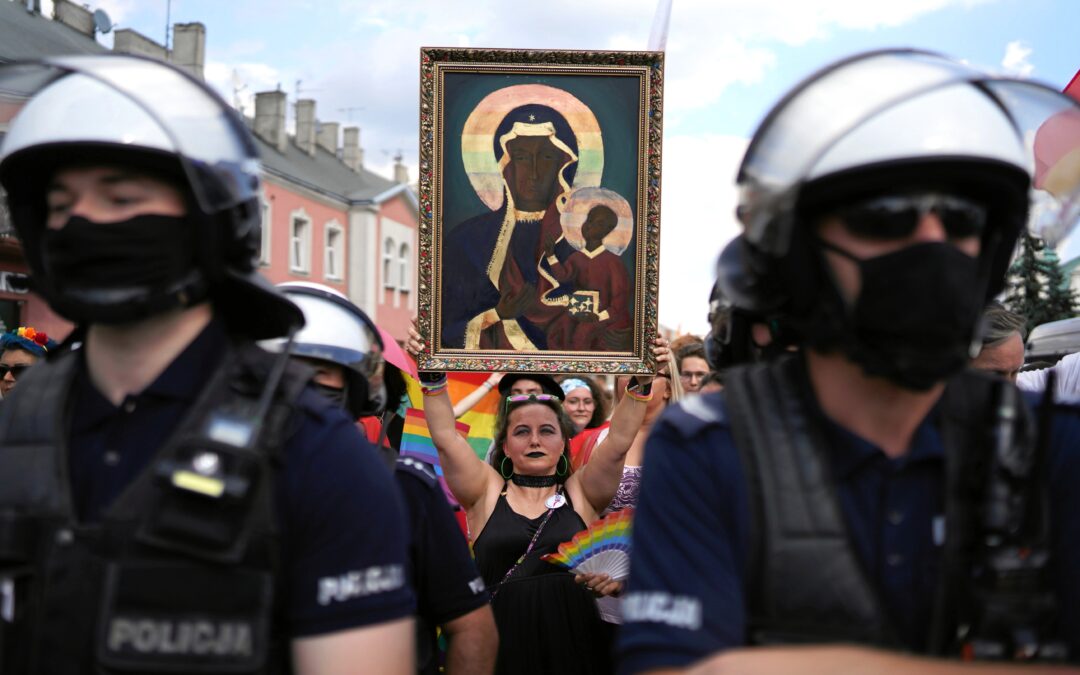A court has found two women guilty of offending religious feelings – a crime in Poland that carries a prison sentence of up to two years – for displaying an image of the Virgin Mary and Jesus with rainbow haloes during an LGBT march.
One was handed five months of community service while the other was fined 2,000 zloty. The pair’s lawyer has, however, announced their intention to contest the judgement, as they are entitled to do, meaning the case would proceed to a full trial.
Profanacja Matki Boskiej na Marszu Równości. Jest wyrok sądu [WIDEO]#wieszwięcej https://t.co/nN3VOgZI7T
— tvp.info 🇵🇱 (@tvp_info) April 21, 2023
The incident in question took place during the 2021 Equality March in Częstochowa, a city that is home to Poland’s holiest Catholic shrine, the Black Madonna. An image of the icon with added rainbow colours is regularly displayed by LGBT activists in Poland.
After the march, police and prosecutors received a number of complaints from individuals who said that the image had offended their religious feelings, reports the Gazeta Wyborcza daily.
One of those statements came from Robert Bąkiewicz, a far-right leader, who said that “intentionally presenting the image [of Mary and Jesus] with the symbol of the sin of Sodom clearly violates my religious feelings”.
To ta profanacja: pic.twitter.com/ztquvhZeSe
— Robert Bąkiewicz (@RBakiewicz) August 21, 2021
After one expert submitted a report concluding that the image should not be seen as offensive to religious feelings, prosecutors – who are under the authority of prosecutor general Zbigniew Ziobro, an outspoken anti-LGBT figure – commissioned a second expert.
He submitted a 70-page opinion concluding that the image did not display the biblical, seven-coloured rainbow symbolising hope and closeness to God, but instead a six-coloured symbol of the LGBT community. He therefore concluded that the image was offensive.
Prosecutors therefore indicted the pair – who are named only as Kamila Ł.-B. and Magdalena W.-D. under Polish privacy law – at the end of last year. Today, the district court in Częstochowa issued a form of ruling that can be made without a full trial based on case files.
It found both to be guilty, and handed down sentences. However, lawyer Adam Kasperkiewicz, who represents both defendents, told Gazeta Wyborcza that he would challenge the judgement. “We want a public trial and will prove that no crime was committed,” he said.
A trans woman has won a landmark case at Poland's Supreme Court, which rejected a request by the justice minister to overturn a ruling that she suffered discrimination when her employer required her to wear male uniform https://t.co/JIC4erPfED
— Notes from Poland 🇵🇱 (@notesfrompoland) December 12, 2022
Last year, the same court in Częstochowa acquitted a man who had also been indicted for offending religious feelings by displaying an image of the Black Madonna with rainbow colours added.
The judge found that the symbol contained a positive – not an offensive – message supporting equality and opposing discrimination. In another case, three LGBT activists were acquitted of the same offence in 2021 for producing and distributing images of the “Rainbow Virgin Mary”.
Poland’s national-conservative ruling camp has mounted a vociferous campaign in recent years against what it calls “LGBT ideology” and presents as an alien threat to national culture and identity. That has led Poland to be ranked as the worst country in the EU for LGBT people.
However, opinion polls show that the Polish public are increasingly accepting of LGBT people and supportive of granting them greater rights, including a majority now in favour of legalising same-sex civil partnerships.
A growing majority of Poles favour the legalisation of same-sex civil unions or marriage, with almost two thirds now in favour, a new poll has found https://t.co/ivS7MswKWi
— Notes from Poland 🇵🇱 (@notesfrompoland) June 10, 2022
Main image credit: Grzegorz Skowronek / Agencja Wyborcza.pl

Daniel Tilles is editor-in-chief of Notes from Poland. He has written on Polish affairs for a wide range of publications, including Foreign Policy, POLITICO Europe, EUobserver and Dziennik Gazeta Prawna.




















